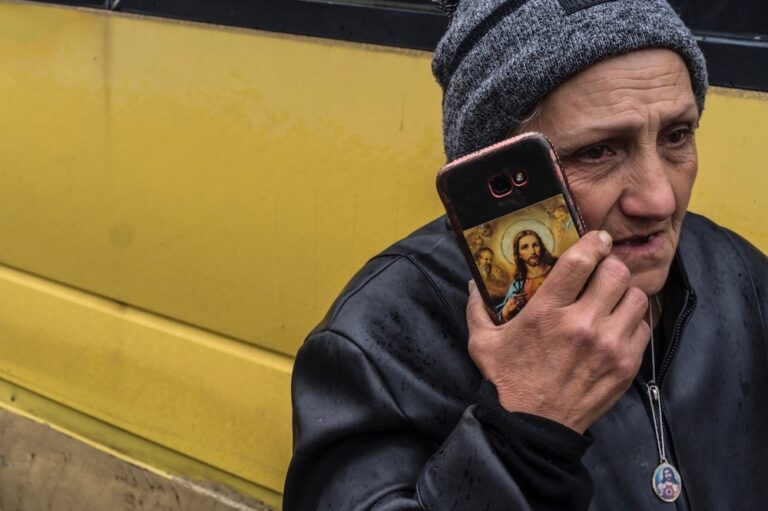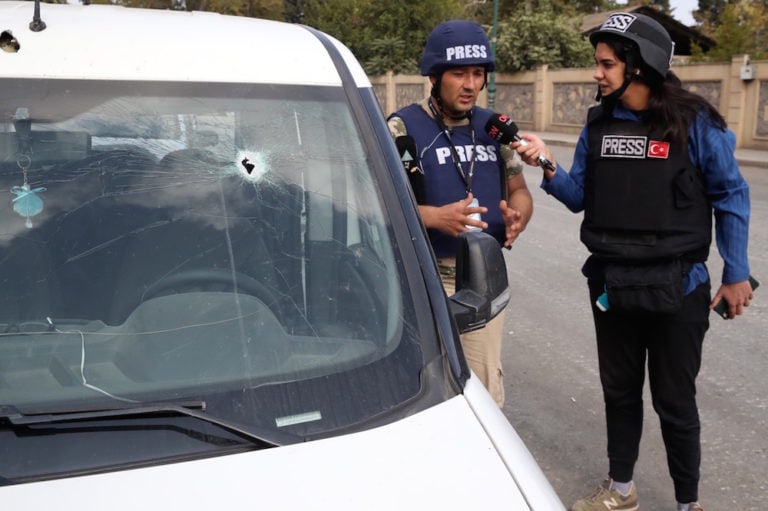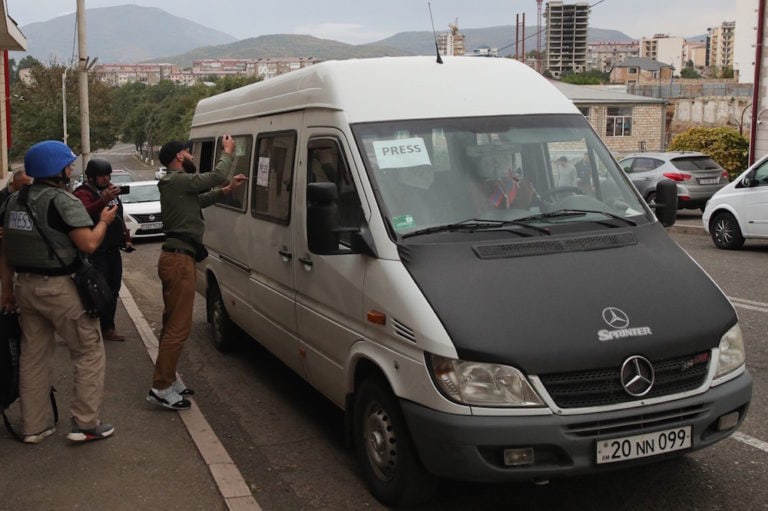**Updates IFEX CH alert and advisories dated 22, 20 February, 31 January 1995** The following is a copy of a CPJ letter to the Armenian government which was written in response to a reply received by the organization to its 2 February 1995 protest letter on the closing of eleven mass media outlets in late […]
**Updates IFEX CH alert and advisories dated 22, 20
February, 31 January 1995**
The following is a copy of a CPJ letter to the Armenian
government which was written in response to a reply received by
the organization to its 2 February 1995 protest letter on the
closing of eleven mass media outlets in late December 1994.
COPY OF LETTER:
March 22, 1995
Levon Zurabian
Assistant to the President
Republic of Armenia
Dear Mr. Zurabian:
Thank you for your response to the Committee to Protect
Journalists’ (CPJ) letter of Feb. 2, 1995, regarding the closing
of 11 mass media outlets on Dec. 28, 1994. We welcome the
opportunity to exchange opinions and discuss different viewpoints
on issues concerning freedom of the press. In the case of
Armenia, we remain especially concerned about physical threats
against working journalists and government measures to suppress
or curtail independent political reporting.
Over the last year, CPJ has documented a severe increase in
incidents of violence against Armenian journalists. We share the
concerns about this disturbing trend that have been expressed by
our colleagues in Armenia. As you know, representatives of 20
Armenian news organizations signed a joint statement on Oct. 28,
1994, condemning violence against journalists in Armenia and
demanding that the government take decisive measures to protect
the lives of journalists.
We have also expressed concern about the fact that Armenian
security agents raided the editorial offices of “Yerkir”, the
official newspaper of the Armenia Revolutionary Party (ARF) and
the largest circulation daily in the republic, as well as 10
other ARF-affiliated and independent publications. Such action
on the part of the government seems to imply an assumption of
guilt, and there has been no indication that these publications
have been given an opportunity to defend themselves in a court
of law.
Again, as you know, leading Armenian journalists share
our view that these actions limit press freedom in a manner
inconsistent with the functioning of a democratic society and
with the guarantees of press freedom stipulated in Armenian
constitutional law.
We would like to briefly respond to the points you raise in your
response of Feb. 21:
1. You object to the fact that we described President
Ter-Petrossian’s recent decree as “suspending indefinitely” the
activities of the ARF. Yet, as you acknowledge, the president’s
Dec. 28 decree ordered the “temporary suspension” of ARF “until
such time as the issue is resolved as determined by law,” without
setting any specific date or even general timetable for a legal
resolution.
2. You state that ARF is not a legitimate “political party” but
rather the public facade of a “secret” organization. CPJ has no
opinion on the legitimacy of any political party in Armenia or
anywhere else. Our objection is that the government action
resulted in the closure of 11 newspapers and magazines reflecting
independent and opposition viewpoints. CPJ’s only concern is
freedom of the press. To restrict the range of opinions and
factual information available to the Armenian public is, in our
view, incompatible with the ideals of democracy.
3. You object to our characterization of ARF as “the” leading
opposition party in Armenia. You are correct. We should have
referred to ARF as “a” leading opposition party in Armenia.
4. Your letter states that no organizations affiliated with ARF
“were suspended either by the Decree or by the court order.” This
may be true. We remain concerned however, about the closure of
publications that expressed independent and opposing viewpoints.
They include:
“Yerkir” (daily)
“Azadamard” (weekly)
“Arakast” (weekly)
“Munedik” (weekly)
“Marzashkharh” (twice-weekly)
Haylour News Agency
Horizon TV Agency
“Andratarts” (monthly)
“Nork” (monthly)
Armenian Documentation Center
Mikael Varandian Printers
5. Your letter further states that “all evidence has been
obtained on the basis of court warrants.” Yet the journalist
working for the publications whose offices were raided by
government agents have all stated categorically in interviews
with CPJ that no warrants were served.
6. You contend that the suspended publications “were
ARF-financed.” Whether or not this is true, these publications
were among many Armenian publications that report facts and
express viewpoints essential to the normal functioning of the
democratic society. These publications have been censored based
on unproved allegations made against individuals who are
employed on those publications. If any individuals is suspected
of committing a crime, the government has the right to present
its case against them in a court of law, and those who are
accused must have the right to defend themselves legally.
Closing the publications that employed them is not a defensible
response.
7. You suggested that our organization was misled by some
opposition groups in your country and that these groups partly
financed our investigation in Armenia. This was not the case. We
sent a research associate to Armenia in Jan., 1995 to investigate
the closing of 11 publications. The information he gathered
during that trip Armenia was based on a variety of sources —
interviews with journalists and editors from the suspended
publications, high-level government officials, members of
parliament and representatives of the opposition political
parties.
As our letter of Feb. 2 clearly states, our staff
researcher visited Armenia with representatives of the
International Human Rights Law Group and Human Rights Advocates
(HRA) in a visit organized by the Covcas Center for Law and
Conflict Resolution. Although CPJ took part in joint interviews
as part of a delegation, each group wrote a separate report on
the findings. In addition, CPJ conducted its own inquiries and
verified the information with independent sources separate from
the mission. Contrary to your assertion, CPJ paid all travel and
lodging expenses for its staff researcher. As an independent,
private, non-partisan, non-profit organization dedicated to the
defense of press freedom around the world, CPJ never accepts nor
uses funds from any government or political party.
CPJ’s investigation into the closing of the 11 Armenia
publications is among the many hundreds of cases we research
every year. In our 1994 annual report “Attacks on the Press”, CPJ
documents more than 700 cases of murder, imprisonment,
harassment, censorship and legal reprisal around the world. CPJ’s
report is recognized as most comprehensive and accurate source of
information on press freedom problems around the world.
8. You state that fair elections do not require the participation
of a political party whose main activities–according to your
allegation– consist of drug trafficking and political
assassinations. We would like to stress again that CPJ has no
position on the legitimacy or ideology of any political party in
Armenia or anywhere else. As journalists, it is our position that
free and fair elections are not possible unless the media is
completely free to report on all contending political viewpoints.
We are very pleased that you share our concerns about freedom of
the press in Armenia. CPJ hopes that Armenian journalists will
still be able to provide the public with objective and truthful
information without fear of retaliation from government
officials. We appreciate the opportunity to exchange views and
look forward to continuing this exchange in the future. We also
would welcome the opportunity to discuss these issues with
Armenian diplomats at the Armenian Embassy in Washington, D.C.,
or with members of the Armenian Mission to the United Nations in
New York.
Sincerely,
William A. Orme, Jr.
Executive Director
[cc list follows]


